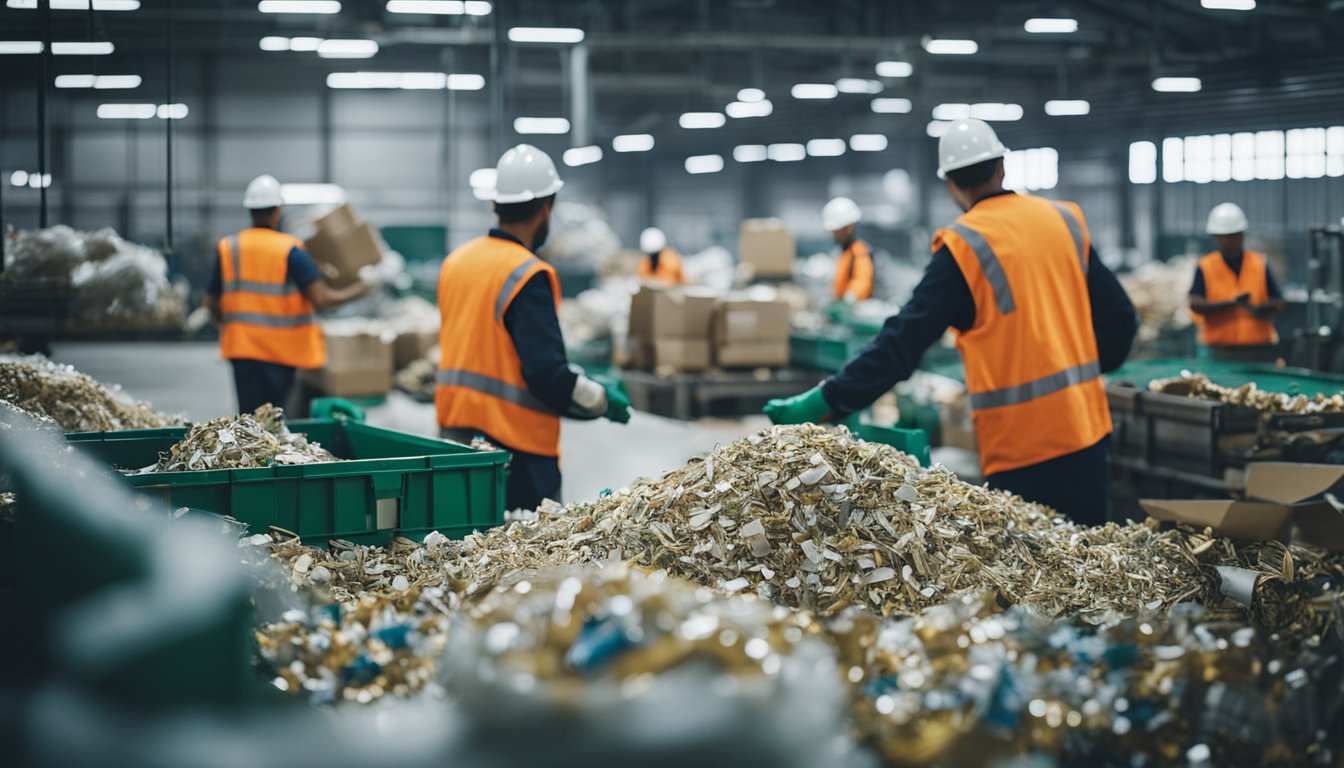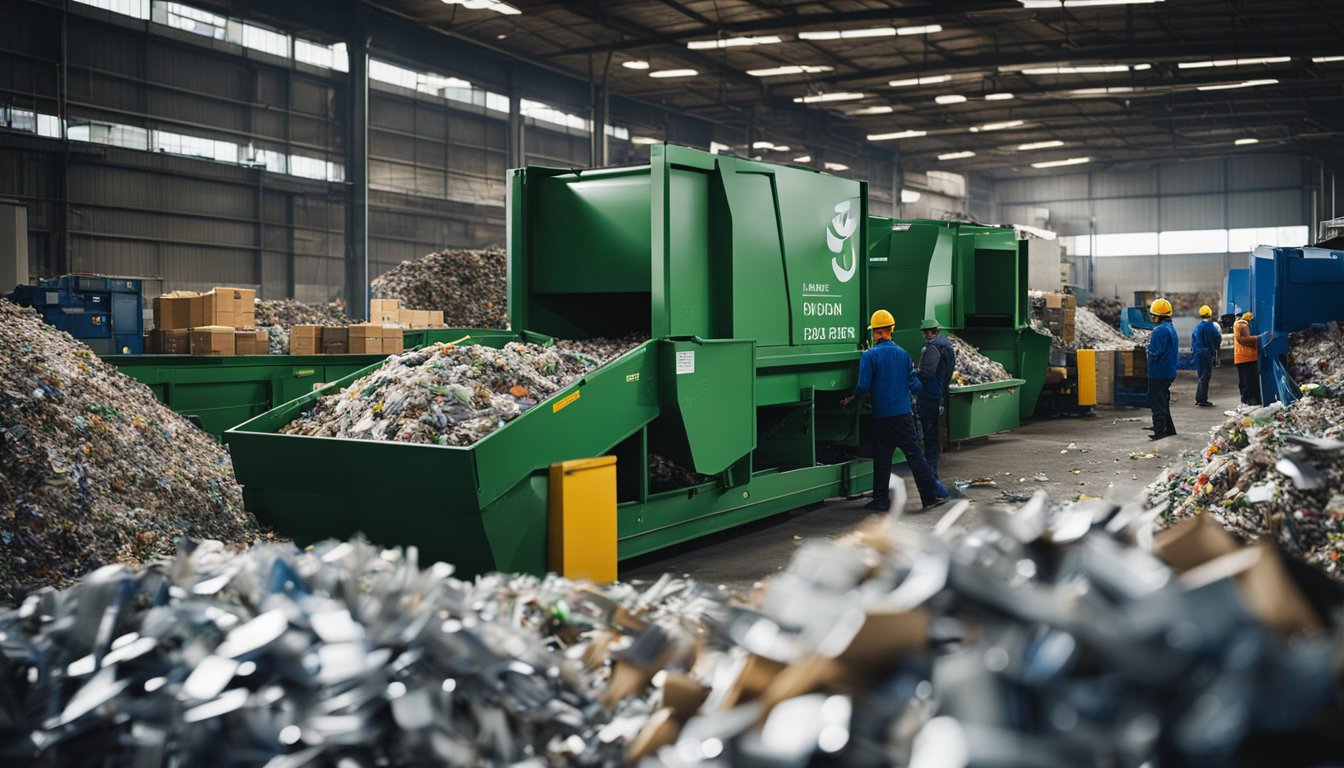Late updated: 23 Dec 2024 14:12
Written by: Amber Collins
Innovative Recycling Methods For UK Businesses: Maximising Sustainability and Efficiency
In the rapidly changing landscape of business, recycling has emerged as not just a necessity but an opportunity for innovation and sustainability. UK businesses are turning to inventive recycling methods to reduce environmental impact while optimising operational efficiency. By embracing these strategies, companies can address climate challenges, align with government waste goals, and contribute to a healthier planet.

Exploring the latest advances in recycling technology reveals several promising techniques that UK businesses can adopt. These approaches not only focus on reducing landfill waste, but also enhance energy efficiency and resource management. Innovative recycling methods serve as a catalyst, prompting companies to rethink traditional practices and move towards sustainable solutions.
The adoption of the circular economy model is gaining traction as businesses aim to minimise waste and maximise resource use. By reintegrating materials back into the production cycle, this model offers an effective pathway to sustainability. As we delve deeper into these methods, it becomes evident that innovative recycling approaches present a multifaceted opportunity for UK businesses to lead in environmental stewardship.
Key Takeaways
- Recycling innovation enhances UK business sustainability.
- Circular economy models significantly reduce waste.
- Advanced recycling tech optimises resource use.
Evolving Technologies in Recycling
Recycling technologies are rapidly evolving, providing innovative solutions to manage waste efficiently and sustainably. Key developments include the integration of artificial intelligence in sorting processes, advanced chemical recycling, and applications of biotechnology. The integration of Internet of Things (IoT) in waste management is also transforming recycling efforts.
Artificial Intelligence and Machine Learning
Artificial intelligence (AI) is revolutionising how we approach recycling. Through machine learning algorithms, AI systems can identify and sort different types of waste more accurately than traditional methods. Recycleye, a leading company in this field, uses AI-driven robotic sorting to distinguish various materials, increasing precision and reducing contamination.
By implementing AI, facilities can optimise their processes, minimise energy consumption, and enhance recycling rates. These technologies offer significant improvements in operational efficiency. Additionally, AI can provide real-time analytics, allowing facilities to adapt quickly to changes in waste composition and volume. Overall, AI is crucial in advancing recycling technologies, ensuring more effective waste management.
Advanced Sorting and Recycling Processes
Innovations in sorting and recycling processes are vital for maximising material recovery. Optical sorters, combined with robotic systems, enhance separation efficiency for glass, plastics, metals, and paper. Advanced sensors and laser technologies allow us to detect and sort materials by their chemical properties.
These processes not only improve sorting accuracy but also reduce labour costs and human error. Automation in recycling plants has led to faster processing times and higher throughput. Improved technologies such as smart bins equipped with fill-level sensors and IoT integration optimise collection routes and prevent overflow by notifying providers when bins need emptying.
Chemical Recycling and Biotechnology
Chemical recycling offers a breakthrough in processing complex materials, including multi-layer plastics. Unlike traditional methods, chemical recycling breaks down polymers into their monomers, which can then be reused to create new products. This method helps decrease reliance on virgin resources and can handle waste that mechanical recycling cannot process effectively.
Biotechnology, specifically the use of bacteria and enzymes, provides additional solutions. Certain microorganisms can degrade plastics into less harmful substances, promoting an eco-friendly recycling cycle. These biological processes can complement chemical techniques, pushing forward the limits of recycling technology.
The Role of 3D Printing and IoT
3D printing and IoT are influencing recycling through creative approaches. By using recycled materials as feedstock, 3D printers can manufacture new products, reducing the need for raw materials. This closed-loop system of production and recycling minimises waste and the environmental impact of manufacturing.
IoT devices, such as smart bins, play a crucial role in waste management. They can monitor fill levels and send data back to central systems for better resource allocation. Through this technology, cities and businesses can effectively plan waste collection, reduce transport costs, and enhance recycling efficiency. The integration of these technologies ensures a smart, connected approach to waste management in the digital age.
Adopting a Circular Economy Model

Adopting a circular economy model involves transforming traditional linear production processes into sustainable systems that prioritise waste reduction, responsible resource use, and the extension of product lifecycles. This section uncovers the significance of sustainable waste management, producer responsibility, and material innovations within this evolving framework.
Waste Reduction and Sustainable Waste Management
A key aspect of the circular economy is the minimisation of waste through innovative recycling methods and conscientious consumption. By focusing on waste reduction, businesses can reduce their carbon footprint and greenhouse gas emissions. Implementing recycling processes and utilising eco-friendly materials such as compostable materials and biodegradable plastics are critical components. Moreover, improving recycling facilities can significantly enhance the effectiveness of waste management, driving efforts toward sustainability. Our approach should include promoting the use of materials like seaweed for packaging, which can be both biodegradable and renewable.
Extended Producer Responsibility
Extended Producer Responsibility (EPR) encourages businesses to take accountability for the environmental impact of their products throughout their lifecycle. This strategy can motivate companies to innovate more sustainable products and incorporate better practices from design to disposal. By implementing EPR, producers assume responsibility for post-consumer product management, leading to a decline in environmental waste. Collaboration with recycling facilities ensures that materials are effectively repurposed, and surplus food is minimised. This not only aids waste reduction but also promotes a culture of responsibility within the corporate sector. An effective EPR scheme can drive manufacturers to rethink their designs to facilitate easier recycling and reduce potential environmental harm.
Engaging with Innovations in Material Use
Engagement with material innovation is crucial in the transition to a circular economy. By harnessing advanced materials and alternative resources, we can significantly impact waste management and sustainability. Utilising biodegradable and compostable materials can position businesses at the forefront of responsible production. As new materials emerge, such as those derived from algae or seaweed, businesses can reduce reliance on traditional plastics, thus diminishing environmental pollution. Emphasising research and development in sustainable materials can not only extend product lifecycles but also offer commercial benefits by differentiating products in the marketplace. Fostering an innovative culture around material use is essential for driving the circular economy forward.
Frequently Asked Questions

Our section explores innovative recycling methods for UK businesses that can align with sustainability goals and economic benefits. We'll cover practical approaches, creative ideas for waste reuse, and how regulatory changes impact these strategies.
What innovative methods can businesses in the UK implement to improve their recycling processes?
Businesses in the UK can adopt single-stream recycling, which simplifies the separation of materials. Implementing advanced sorting technologies, like optical sorters, can increase efficiency. Companies may also consider investing in compactors to reduce waste volume, making transportation and handling more cost-effective.
What are some cutting-edge ideas for companies looking to enhance recycling of waste materials?
Some companies are exploring closed-loop systems, where waste materials are reused in the production cycle. Others are turning to waste-to-energy technologies, converting refuse that cannot be recycled into electricity. Adopting AI-driven waste management systems can optimise sorting and reduce contamination rates in recycling streams.
How can UK businesses contribute to innovation in plastic recycling?
UK businesses can focus on using biodegradable plastics and reducing single-use plastic dependency. Engaging in partnerships with technology firms to develop more efficient recycling processes, such as chemical recycling, is also a promising approach. Encouraging consumers to return post-consumer plastics can further support these efforts.
What strategies are UK companies adopting to turn waste materials into innovative products?
Some companies are transforming scrap materials into valuable goods, such as turning glass waste into building materials or converting organic waste into compost. Others are capitalising on the circular economy model, creating products using recycled inputs, which also includes clothing made from recycled fibres.
How are changes in the UK's recycling regulations affecting business recycling practices?
Changes in recycling regulations, set for 2025, advocate for standardised collection systems across the UK. This push for consistency is driving businesses to re-evaluate and adapt their recycling processes to ensure compliance. New policies are also designed to increase transparency and accountability in waste reporting.
In what ways can UK businesses generate revenue through improved recycling and waste management?
By recycling more efficiently, businesses can reduce landfill tax expenses and waste disposal costs. Selling segregated recyclables such as metals can create an additional revenue stream. They may also explore government incentives for meeting sustainability benchmarks, further enhancing their financial returns from adopting greener practices.
